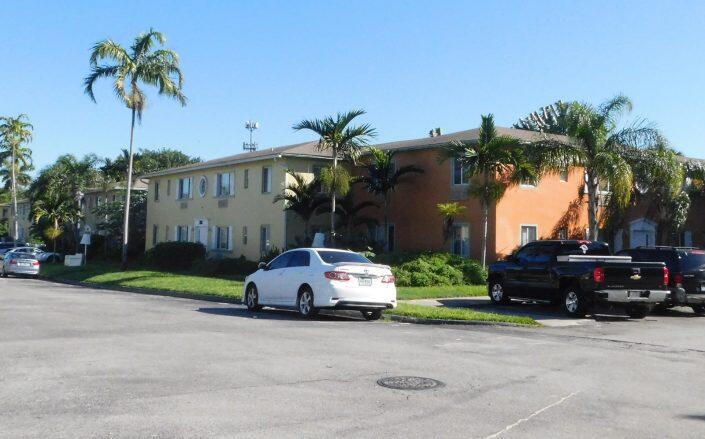For the ninth time, the city of Miami’s Planning Zoning and Appeals Board deferred voting on a controversial mixed-use, high-rise project that would exceed 5 million square feet. It’s slated to replace the 512-unit Design Place apartment complex near Little Haiti.
By a vote of 7 to 3, the board deferred voting on the project formerly known as Eastside Ridge to Sept. 12. David Snow, Miami’s chief of urban design, said the planning department needs more time to analyze developer SPV Realty’s latest proposal, which was submitted in May.
First unveiled in 2016, Eastside Ridge has been repeatedly deferred since 2018. After it was deferred a fifth time, SPV Realty sued the city of Miami, demanding a yes or no vote on the project so that it can receive a hearing at the Miami City Commission. The lawsuit was ultimately dismissed in April 2020.

SPV Realty LC wants to replace low-rise Design Place (pictured here) with a massive 5-million-square foot community with new apartments, hotels, retail, offices, and even a vocational school. Photo by Erik Bojnansky
The planning board has routinely requested that SPV Realty’s development team meet with area residents and activists who fear that the 22-acre project will speed up gentrification, increase traffic on already congested roads, and be out of scale with the surrounding area. Adding to the anxiety of some local residents was the commission’s approval of other mega-projects, called special area plans, within a mile of Design Place, including the 8 million-square-foot Magic City Innovation District.
The planning board, itself, has called for an end to special area plans, which enable developers who own more than 9 acres of land to seek massive zoning changes from the Miami City Commission in exchange for “community benefits.” The commission has not acted on that recommendation.
In response to “significant community input,” SPV Realty decided to redesign the project “from the ground up,” according to Melissa Tapanes Llahues, one of SPV Realty’s attorneys.
Now called Sabal Palm Village, the project will consist of 2,929 apartments; 168,011 square feet of office space; 296,297 square feet of retail; a 400-room hotel; and a 43,760-square-foot vocational school, Tapanes Llahues said in a May 7 letter to Miami Planning Director Cesar Garcia-Pons. The maximum height of the buildings would be 20 stories. Originally, the developers sought to build high-rises as tall as 28 stories.
Tapanes Llahues told the board that her client is prepared to spell out its offered community benefits in a new development agreement. Those benefits include the creation of public spaces with butterfly gardens and fish ponds, public art created by local and Caribbean artists, and sub-tropical flora “inspired by the tropical gardens of Haiti.” Tapanes Llahues added that the new development agreement will provide guarantees for on-site workforce housing, the promotion of local businesses, and jobs.
Denise Gharety, an attorney with Community Justice Project, said if the project has indeed been changed from “the ground up” then, under the city’s Miami 21, zoning code, the developers may need to re-apply. As for the offer to provide workforce housing on site, Gharety reminded the board that under HUD regulations such units can be rented out for $2,149 a month. “That is not affordable to people living in the Little Haiti community,” she said.
Sabal Palm was the original name of the low-rise apartment complex now standing at 5175 Northeast Second Avenue. Constructed in 1948, the property was purchased for $6 million by SPV Realty in January 2000. Sharon Olsen, the listed owner of SPV Realty, is the wife of Jay Podolsky, who owns Amsterdam Hospitality Group with his brother Stuart. The Podolsky brothers are controversial figures in New York City, particularly for their purported dealings with Mayor Bill De Blasio’s administration in 2019.
